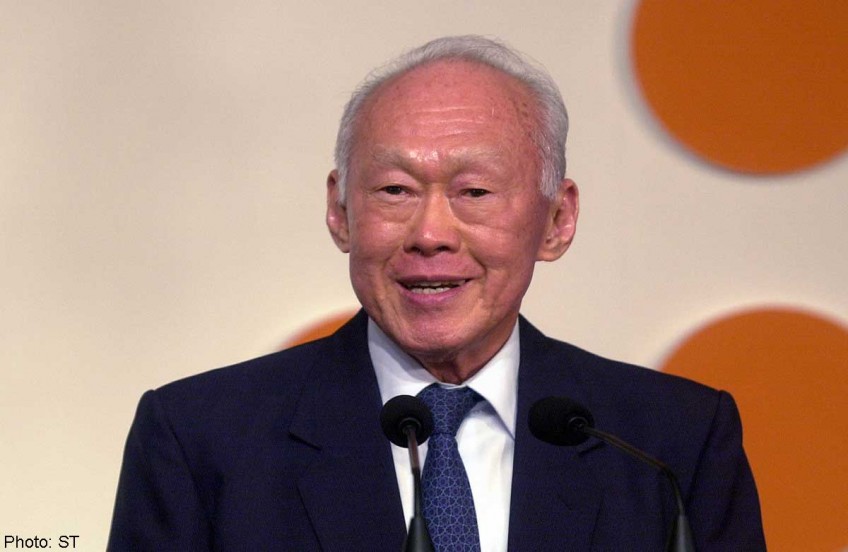He wasn't afraid to show his true colours

If Lee Kuan Yew were able to see the tens of thousands who waited for hours in line to pay their last respects to him, what would he think?
A sense of gratitude, no doubt, but perhaps also surprise at the open display of emotion.
In life, he wasn't one who sought adulation, once proclaiming it was better to be feared than loved.
His public persona reinforced the image of a hard-headed, no-nonsense leader who didn't care much about whether the people approved of his ways as long as he believed they were in the country's interests.
In turn, many did fear him, even if they also respected what he achieved.
How then to explain the widespread show of emotion at the passing of Singapore's founding Prime Minister?
Even those critical of the current government and its policies joined in the mourning.
A friend related to me that within his social circle, some of whom were openly anti-government, several were in the crowd that waited in line for hours.
Such a spontaneous response from so many, young and old, including those ambivalent towards his record, could have come only from an instinctive grasp of the man and his achievements.
In the moment of grief, who he was mattered more than what he did.
Of course, the two are intertwined.
He achieved much because of who he was.
But I believe the "who" made a deeper connection because of three qualities that defined who he was to Singaporeans.
First, and which has been widely pointed out, was his frugality.
He lived in the same house for 70 years, keeping it in largely the same condition. He wasn't interested in doing it up to keep up with his neighbours.
He wore the same jackets, preferring to patch them up rather than buy new ones.
Singapore was lucky to have a leader who wouldn't have known what to do with the money had he been tempted to go the way of many other corrupt leaders.
Even luckier that his wife shared his frugal ways.
This made a deep impression on the people, especially during the earlier days when he was actively in charge, and they could size him up at close quarters.
His frugality made people see him as part of them, not someone apart and distant.
Second was his strong and determined leadership.
Everyone knew who was boss in Singapore when he was around.
You didn't need to understand his arguments or even agree with his policies.
You felt the force of his conviction and personality.
This, too, made a lasting impression during the years when the people needed someone strong to chart the country's future.
Third was his passion and commitment to Singapore, his lifelong project.
I don't need to explain this because, of all the qualities he displayed, this was the one most universally acknowledged.
Singaporeans could instantly relate to these three qualities of the man at an emotional level.
But the way they responded also says something about themselves, a people who have sometimes been given less credit than they deserve.
You know the usual complaints: that they are spoilt, always complaining and don't know what is good for them because of so many years of peace and abundance.
They might be some or all these things but there is also a Singapore spirit that has developed over the years, a shared understanding of what the country means to them.
I think this also includes knowing which leaders have their interests at heart.
It is fashionable these days to say that old-style leaders like Mr Lee are no longer relevant because the people want a different kind of ruler.
Indeed, arrogant, top-down and self-serving leadership would be instantly exposed in today's 24/7 news cycle and social media.
But the new media landscape also means that political leaders here and elsewhere are judged endlessly - for what they say, their body language and the action they take in response to the issues of the day.
Many find it hard to cope with this ceaseless exposure and suffer the consequences of their character being put on public trial.
Under this sort of scrutiny, it is almost impossible to put on a false front for long without being found out for who you really are.
Lee Kuan Yew would have thrived in these conditions.
He was the type of leader who would welcome the public examination because he wasn't afraid to show his true colours, warts and all.
It doesn't mean he would use the same tactics and policies because circumstances and expectations have changed and the old methods might not work.
But being who he was, he would likely find new methods and policies in tune with present-day needs and expectations.
There's a lesson here for leaders everywhere.
hanfk@sph.com.sg

This article was first published on Apr 5, 2015.
Get a copy of The Straits Times or go to straitstimes.com for more stories.